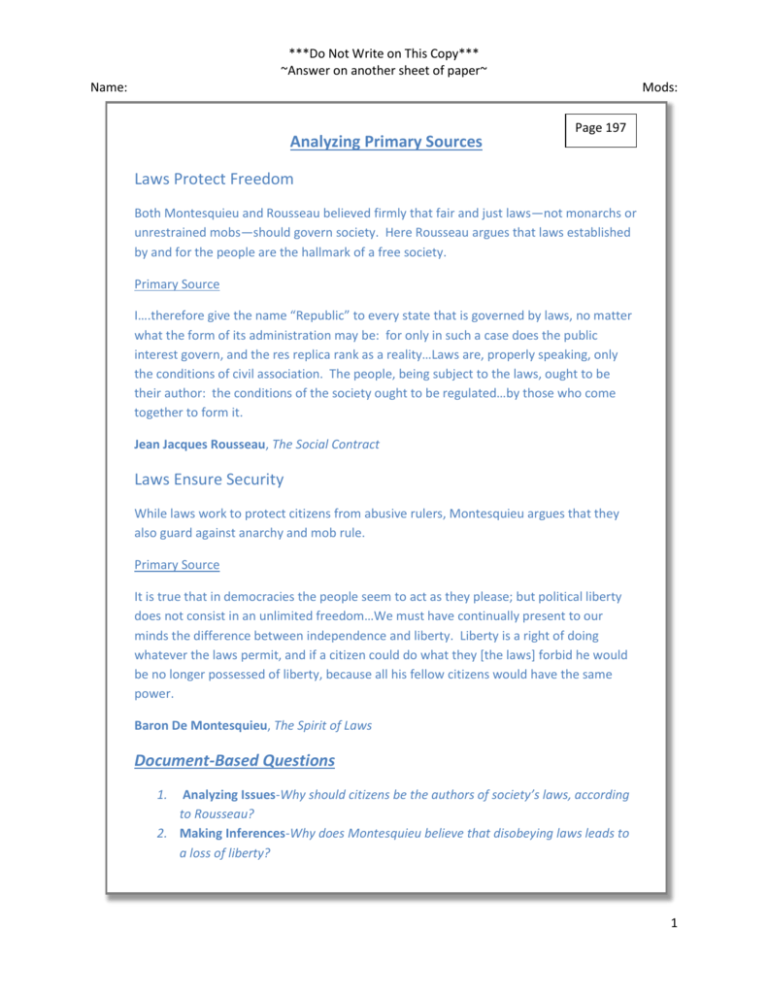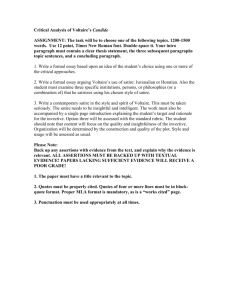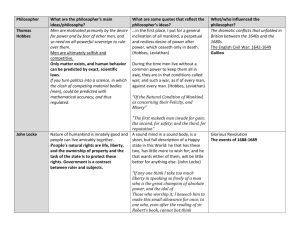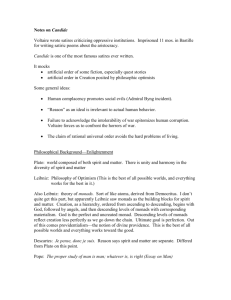Enlightenment Thinkers-Primary Sources
advertisement

***Do Not Write on This Copy*** ~Answer on another sheet of paper~ Name: Mods: Analyzing Primary Sources Page 197 Laws Protect Freedom Both Montesquieu and Rousseau believed firmly that fair and just laws—not monarchs or unrestrained mobs—should govern society. Here Rousseau argues that laws established by and for the people are the hallmark of a free society. Primary Source I….therefore give the name “Republic” to every state that is governed by laws, no matter what the form of its administration may be: for only in such a case does the public interest govern, and the res replica rank as a reality…Laws are, properly speaking, only the conditions of civil association. The people, being subject to the laws, ought to be their author: the conditions of the society ought to be regulated…by those who come together to form it. Jean Jacques Rousseau, The Social Contract Laws Ensure Security While laws work to protect citizens from abusive rulers, Montesquieu argues that they also guard against anarchy and mob rule. Primary Source It is true that in democracies the people seem to act as they please; but political liberty does not consist in an unlimited freedom…We must have continually present to our minds the difference between independence and liberty. Liberty is a right of doing whatever the laws permit, and if a citizen could do what they [the laws] forbid he would be no longer possessed of liberty, because all his fellow citizens would have the same power. Baron De Montesquieu, The Spirit of Laws Document-Based Questions 1. Analyzing Issues-Why should citizens be the authors of society’s laws, according to Rousseau? 2. Making Inferences-Why does Montesquieu believe that disobeying laws leads to a loss of liberty? 1 ***Do Not Write on This Copy*** ~Answer on another sheet of paper~ Name: Mods: Answers to Document-Based Questions 1. They are the ones who will be subject to the laws. 2. Without a sense of justice, people would do whatever they wanted. 2 ***Do Not Write on This Copy*** ~Answer on another sheet of paper~ Name: Mods: Different Perspectives: Using Primary Sources Satire European Values During the Enlightenment Satire is an artistic style that uses humor to ridicule the practices of a society or institution through art instead of open criticism. For example, Voltaire’s main characters maintain optimism despite constant evidence of stupidity and evil, implying that optimism and its followers lack reason. Writers and artists of the Enlightenment often used satire to comment on European values. Using wit and humor, they ridiculed various ideas and customs. Satire allowed artists to explore human faults in a way that is powerful but not preachy. In the two literary excerpts and the painting below, notice how the writer or artist makes his point. Primary Source Wit=an ability to say or write things that are clever and usually funny Voltaire Voltaire wrote Candide (1759) to attack a philosophy called Optimism, which held Primary Source that all is right with the world. The hero of Jonathan Swift the story, a young man named Candide, encounters the most awful disasters and human evils. In this passage, Candide meets a slave in South America, who explains why he is missing a leg and a hand.— “When we’re working at the sugar mill and catch our finger in the grinding-wheel, they cut off our hand. When we try to run away, they cut off a leg. I have been in both of these situations. This is the price you pay for the sugar you eat in Europe…The Dutch fetishes [i.e., missionaries] who converted me [to Christianity] tell me every Sunday that we are all the sons of Adam, Whites, and Blacks alike. I’m no genealogist, but if these preachers are right, we are all cousins born of ‘first cousins. Well, you will grant me that you can’t treat a relative much The narrator of Gulliver’s Travels (1726), an English doctor named Lemuel Gulliver, takes four disastrous voyages that leave him stranded in strange lands. In the following passage, Gulliver tries to win points with the king of Brobdingnag—a land of giants—by offering to show him how to make guns and cannons.— The king was struck with horror at the description I had given of those terrible engines…He was amazed how so impotent and groveling an insect as I (these were his expressions) could entertain such inhuman ideas, and in so familiar a manner as to appear wholly unmoved at all the scenes of blood and desolation, which I had painted as the common effects of those destructive machines; whereof, he said, some evil genius, enemy to mankind, must have been the first contriver [inventor]. worse than this.” 3 ***Do Not Write on This Copy*** ~Answer on another sheet of paper~ Name: Mods: Primary Source William Hogarth The English artist William Hogarth often used satire in his paintings. In this painting, Canvassing for Votes, he comments on political corruption. While the candidate flirts with the ladies on the balcony, his supporters offer a man money for his vote. Document-Based Questions 1. What is the main point that Voltaire is making in Source A? What technique does he use to reinforce his message? 2. What does the king’s reaction in Source B say about Swift’s view of Europe’s military technology? 3. Why might Hogarth’s painting in Source C be difficult for modern audiences to understand? Does this take away from his message? 4 ***Do Not Write on This Copy*** ~Answer on another sheet of paper~ Name: Mods: Answers to Document-Based Questions 1. Christian missionaries are hypocritical in their treatment of slaves. Voltaire shows this by contrasting the brutality of slavery with missionaries’ empty words about all men beings the sons of Adam. Voltaire uses satire to reinforce the message of hypocrisy [falseness]. 2. He saw much technology as cruel and wasteful. 3. Hogarth’s painting requires knowledge of the unfamiliar elements in the scene that most modern audiences will lack. However, once the elements are understood, observers can more easily emphasize with Hogarth’s message about political corruption. 5






